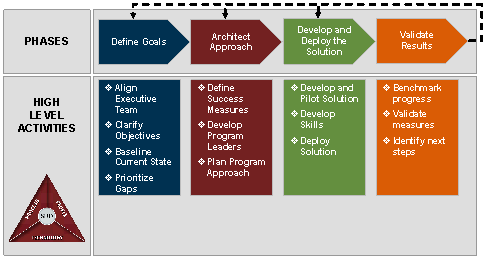|
|
| Home - Industry Article - Jun 06 Issue |
Mergers: A Change Agent for Software Development
continued... page 2 |
Following a Proven, Process Improvement Approach
While many merging organizations consider people, process and technology as they establish new ways of doing business, most organizations are still not looking at how to make changes in their development organization in these three areas holistically. And, even fewer organizations are attempting to address these three areas simultaneously.
To ensure organizations have a holistic response, that meets individual business goals, a proven, process improvement implementation framework such as the one below can help:

Phase 1
The first phase enables the rapid initiation of improvements using workshops that align executive management with improvement of team leaders on expected business results. Teams choose a project or activity that makes a difference to the business and fits into the organization's strategic plan. Following initial workshop sessions, organizations generally perform a baseline assessment to gain agreement on the current state of the organization, with respect to the area of improvement. For example, if the business problem being addressed is schedule predictability, baseline information is gathered about project planning and tracking processes, project management skills, technology in use, and project performance data.
Phase 2
The second phase generally involves workshops, in which facilitators help organizations plan the program approach, define the measures of success, and develop program leaders. In addition, experts can provide guidance about organizational change management, and deliver the skills for teams to establish and manage the content of an initiative. For example, if an organization wants to drive sound project management practices, portfolio management and project control, it may need help launching and evolving a well-structured Project Management Office (PMO). In hands-on sessions, companies can gain assistance facilitating the development of a PMO charter, implementation plan, key milestones, and near-term detailed work plan.
Phase 3
During the third phase, the improvement team gathers input and useful process assets from the organization, integrating them with industry's best practices, to develop and pilot a solution, develop skills, and deploy the solution. For example, experts can help identify best practices and process improvements, then help teams refine delivery workflow (process/technology) using pilots to ensure process and tool effectiveness. Once the solution is in place, experts help internal teams validate migration from current states and define a support plan for broad rollout.
Phase 4
Measurement is the means for gaining and keeping consensus at all levels of the organization for the value of an improvement initiative. In the final phase, activities focus on validating that targeted improvements have been achieved. This includes appraisals, measurement and data reviews, and executive briefings to reset baselines for future stages of improvement. While measurement to the goals goes on throughout an initiative, this phase ensures that the targets are being met, encourages setting of new targets, and identifies what should be done in a next iterative of improvement.
Conclusion
For merging technology companies, transforming critical software development into a managed business process should be viewed as a multi-year process that requires serious preparation, planning and piloting of approaches. In order to be most effective, distributed development teams must have standardized processes, the skills training and the appropriate technology in place. In addition, merging entities should consider working within a proven improvement framework that can deliver different types of solutions that enable teams to meet a variety of business objectives.
Chris Barbin is Senior Vice President of Business Operations for Borland Software Corporation. His experience includes advising large government agencies and global corporations in ways to improve their distributed software development and outsourcing initiatives to accelerate software delivery optimization. For article feedback, contact Chris at chris.barbin@borland.com
 

|
|


|

